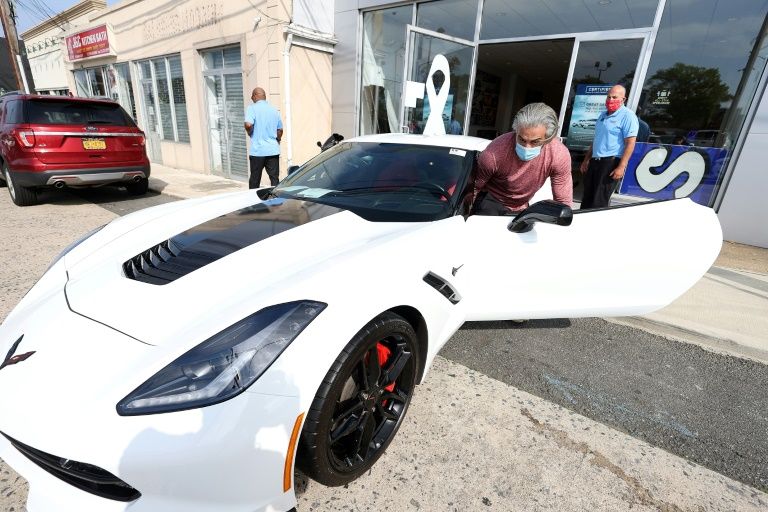US auto sales drop less than expected in Q3
New York (AFP) – Automakers reported better-than-expected third-quarter US auto sales Thursday, pointing to strong demand for trucks and a boost from low interest rates.
Auto giants General Motors, Fiat Chrysler and Toyota saw vehicle sales fall about 10 percent for the quarter ending September 30, but that decline was smaller than analyst estimates and a big improvement from the second quarter when coronavirus restrictions were at their most severe.
Besides a boost from low interest rates, car sales have also been supported by a shift in consumer spending away from vacations and other discretionary items, company officials said.
But analysts warned that car sales could suffer in the fourth quarter, in part because of the income hit from a stalemate in Congress over the latest coronavirus spending bill. Data from the Commerce Department Thursday showed a 2.7 percent drop in income.
“The huge decline in household income is a warning that the economy is still heavily dependent on government social welfare payments,” said economist Joel Naroff in a note.
GM pointed to strong demand for its fleet of sport utility vehicles and trucks. US sales came in at 665,192 during the quarter, down 9.9 percent from last year, but better than the 13.5 percent projected by Cox Automotive and a big improvement on the 34 percent plunge in the second quarter.
“Our dealers are doing exceptionally well utilizing a combination of customer-facing online technologies… and showroom sales to deliver vehicles safely to our customers,” said Kurt McNeil, GM’s vice president for US sales operations.
“Industry-wide, dealers are selling a high mix of large pickups as the summer comes to an end. Our strong large pickup and all-new full-size SUV lineups from Chevrolet and GMC are selling extremely fast.”
FCA also pointed to strength in large vehicles with strong trends for Ram pickup trucks and some Jeep models.
Overall sales came in at 507,351, down 10 percent from the equivalent period of 2019. Cox had estimated a drop of 11.8 percent. Sales fell 39 percent in the second quarter.
“The results reflect the hard work our dealers have done throughout the third quarter as they worked through the Covid-19 restrictions while still improving our sales over the prior months,” FCA’s Jeff Kommor said.
“Jeep and Ram are hot and we continue to prioritize deliveries to our dealers who are asking us to ship as many vehicles as we can build.”
At Toyota, US sales fell 11 percent to 558,449 in the third quarter, compared with a 12.9 percent drop expected by Cox. Toyota pointed to a pickup in September, with sales up five percent compared with the year-ago period.
– Lingering drag from shutdown –
Auto dealer sentiment had improved significantly from the depths of the second quarter amid coronavirus lockdowns. However dealers are worried about lean vehicle inventories that could crimp sales, according to dealer survey data cited by Cox.
Charlie Chesbrough, senior economist at Cox, said car companies have still not made up for the manufacturing shortfall from about a two-month shutdown due to the coronavirus.
The shutdown reduced inventory by about 3.3 million vehicles and delayed production of 2021 vehicles. Only about three percent of the models now in dealerships are 2021 versions, compared with 25 percent a year ago, Chesbrough said.
But there are also demand factors that will challenge the industry, including lower consumer confidence amid higher unemployment and the lack of new stimulus funds for laid off workers.
“The recovery has been a little bit surprising,” Chesbrough said, adding that it “may not be able to continue.”
In light of the Washington stalemate on stimulus, “we can see that the economy is going to wane a bit,” he said.
Disclaimer: Validity of the above story is for 7 Days from original date of publishing. Source: AFP.


